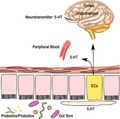- Record: found
- Abstract: found
- Article: found
Effects of regulating gut microbiota on the serotonin metabolism in the chronic unpredictable mild stress rat model

Read this article at
Abstract
Objective
This study was to inspect the antidepressant‑like effect of prebiotics and probiotics, and to explore the effect of modulating gut microbiota on the serotonin (5‐HT) metabolism.
Methods
Fifty rats were separated into control and other four groups randomly. The four groups underwent the chronic unpredictable mild stress (CUMS) intervention with or without prebiotics and probiotics ( Bifidobacterium longum, L. rhamnosus) treatment. After weighted, the animals underwent a series of behavioral tests comprising the sucrose preference test (SPT) and the forced swimming test (FST). Central and colonic serotonin levels and relative metabolism factors were measured and analyzed. Microbiota was examined by 16S rRNA gene pyrosequencing.
Results
CUMS intervention caused a decrease in body weight, an increase in FST, and a decrease in SPT. Prebiotics and probiotics all ameliorated the CUMS‐induced loss of weight and depressive‐like behaviors to a certain extent, especially L. rhamnosus. Compared with the group of CUMS intervention, the rats of probiotics and probiotics treatment had a tendency to reduce colonic 5‐HT and increase 5‐HT in frontal cortex and hippocampus. However, there was no significant difference in peripheral blood 5‐HT among these groups. Furthermore, CUMS caused noteworthy gut microbiota variations at the phylum and other levels in rats. Remarkably, there were considerable relations of perturbed gut microbiota with the changed metabolism of 5‐HT.
Abstract
We selected common prebiotics and probiotics to explore the effect of modulating gut microbiota on serotonin(5‐HT) metabolism. The results confirmed that prebiotics and probiotics could ameliorate depressive‐like behaviors and alleviate chronic unpredictable mild stress (CUMS) induced raised colonic 5‐HT and reduced central 5‐HT through the altered metabolic enzymes. Furthermore, CUMS caused noteworthy gut microbiota variations, and there were considerable relations of perturbed gut microbiota with the changed metabolism of 5‐HT.
Related collections
Most cited references37
- Record: found
- Abstract: not found
- Article: not found
Responding to public and private politics: corporate disclosure of climate change strategies
- Record: found
- Abstract: not found
- Article: not found
The catecholamine hypothesis of affective disorders: a review of supporting evidence.
- Record: found
- Abstract: found
- Article: not found
